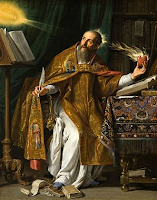What heresy is, according to Opera Augustine, and me
Every so often a dcument called "What is heresy?" by Opera Augustine is brought to my attention, such is the way of automated programmes telling me what I am interested in.
Opera Augustine is Roman Catholic, probably (though I am not conversant with the shadings of RC adherence) of a central-conservative disposition. Perhaps 'traditionalist' would be a fair description. I am happy to be corrected.
I put this first because his comment on heresy remains within the bounds of the Roman Catholic Church. His statement is universal but its application is local.
 |
| St. Augustine by Phillipe de Champagne (Wiki) |
Heresy
"Heresy is an emotionally loaded term that is often misused."
yet he offers no evidence to support either part of this assertion.
He tells us some uncontroversial things that heresy is not and then cites the Roman Catechism:
"Heresy is the obstinate post-baptismal denial of some truth which must be believed with divine and Catholic faith, or it is likewise an obstinate doubt concerning the same; apostasy is the total repudiation of the Christian faith; schism is the refusal of submission to the Roman Pontiff or of com munion with the members of the Church subject to him" (CCC 2089)
To qualify as a heretic a person must:
refuse to be corrected
be baptised, and
doubt or deny "a matter that has been revealed by God and solemnly defined by the Church (for example, the Trinity, the Incarnation, the Real Presence of Christ in the Eucharist, the sacrifice of the Mass, the pope’s infallibility, or the Immaculate Conception and Assumption of Mary)."
Some people cannot be heretics: anyone, it seems, who is not a Roman Catholic. He then lists a few of the named heresies of the early centuries of the Church.
==================
Within his limited chosen parameters I don't doubt that Opera Augustine is correct.
But for those whose religious world is not restricted to the walled garden of Roman Catholicism, and who do not accede to theological colonialism, heresy is both more diverse and inherently less ordered.
Orthodox Churches, Protestant Churches and, so far as I know, churches which disdain such categories, have all had their heresies and heretics. I say this with confidence - albeit without much evidence beyond my own self-selected parameters of heresy in Britain and Ireland from 1689 to the present - because heresy is a function of orthodoxy.
I suggest that heresy is an inevitable aspect of all belief-based structures and cultures. Even scientific culture has its wild shores just beyond the reach of current knowledge. As knowledge grows old theories - old formulations of theology - are discarded and forgotten. The gap between what we know now and what will know tomorrow has plenty of room for uncertainty, speculation and, occasionally. heresy.
As theology develops and changes with time and circumstance, so too does heresy: the heresy of the eighteenth-century was not that of the twentieth; heresy in, say, the Church of Scotland was not the same as heresy in the Church of England.
What I suggest heresy is:
Heresy is a theo-legal judgement.
The judgement takes the form of a statement that certain specified teaching, having been duly examined by an authorised court or council, has been judged to lie outside acceptable boundaries of interpretation of the teaching and authoritative documents of the church concerned. The specified teaching is thus evidence for a judgement of heresy (or, very occasionally, for a judgement of not guilty).
Heresy cases are specific to a church, a time, and to the particular statement of doctrine that was the subject of trial. One consequence is that there is only a very constrained legacy of judgements to guide future courts.
Heresy is rare and normal.
Comments
Post a Comment
Comments and corrections are welcome. But please note that the focus is on the historical examination of heresy cases, not the rights and wrongs of the theology..